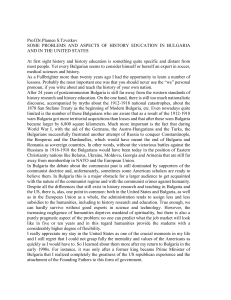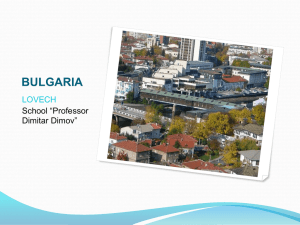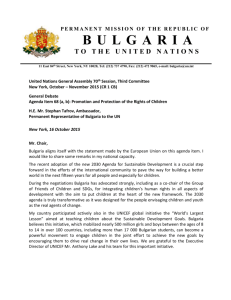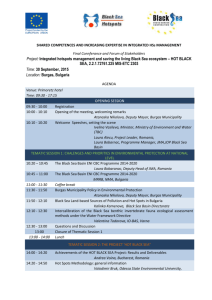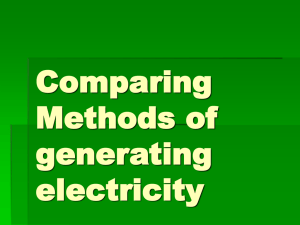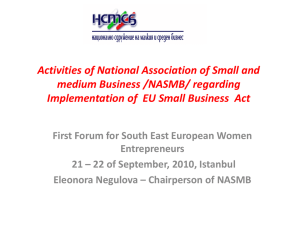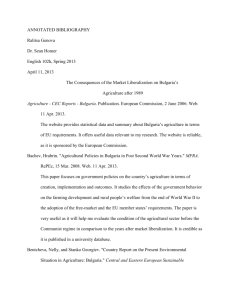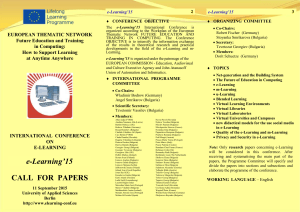Approach toward the environment
advertisement
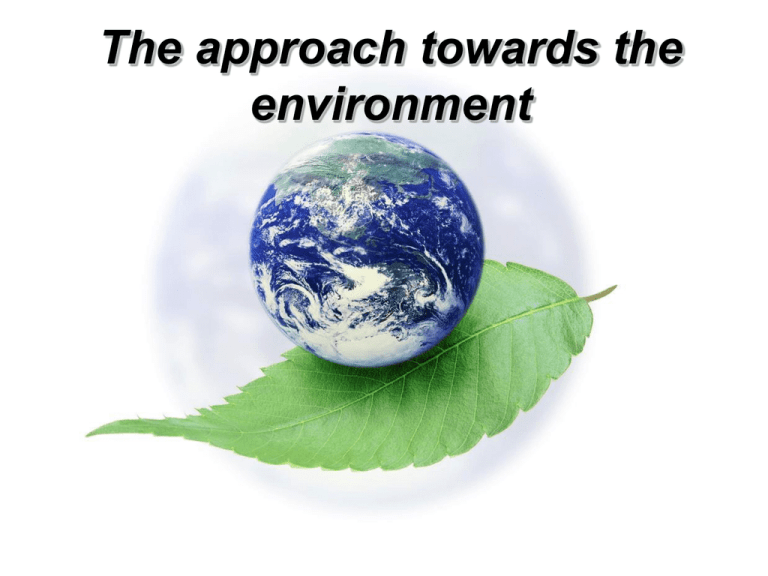
The approach towards the environment Use of energy Bulgaria exhibits a fairly diverse energy mix with an average dependency on imported fuels (oil and natural gas from Russia and also solid fuels). Domestic production includes nuclear energy and solid fuels which are also the main fuels for electricity generation Types of renewable energy used in Bulgaria Bulgaria is a sunny country and the solar energy has been used for ages. Nowadays the solar energy is one of the most popular ways of producing environmentally friendly energy at low price. Among other countries, Bulgaria also offers potential for construction of wind farms, more specifically along the coastal line and at places with altitude of 1000 meters or more. The manufacture of wind is a new business for Bulgaria but it is developing very quickly. By 2015 there will be 600 wind energy sources. Hydroelectricity Hydroelectricity is the term referring to electricity generated by hydropower; the production of electrical power through the use of the gravitational force of falling or flowing water. It is the most widely used form of renewable energy. Once a hydroelectric complex is constructed, the project produces no direct waste. In Bulgaria we have 86 of water power plants. Belgium energy Bio-energy Biological methods based on photosynthesis, for example the use of biological waste or growing bacteria that produce oil. Also trees, elephant grass or other fast-growing plants that burn or generate fermentable biomass could be used. • Water energy Wave Energy The movement of the waves of the sea is used to generate electricity. Tidal energy The differences in water level of the tides through turbines into electrical energy is converted. Blue energy The energy that can be won by the difference in salt concentration between seawater and freshwater. Hydroelectric power Energy from height of water, usually by building a dam or a natural waterfall. OTEC (Ocean Abbreviation of British Thermal Energy Conversion). This technique uses the temperature difference between surface and deeper layers of the ocean to generate electricity. Hungaria • The hungarian people used a lot of old cars but these cars were bad for the environment. Today engineers are working on designing hybrid cars, it protect the environment from the polluting gases. • The recycling bins appeared on the streets. We can separate about 5 different materials: paper, glass, tin or aluminum cans and plastic bottles. Recycling bins exist in various sizes for use in homes, offices, and large public facilities. Ajka alumina plant accident • The The Ajka alumina sludge spill was an industrial accident at a caustic waste reservoir chain of the Ajkai Timföldgyár alumina plant in Ajka, Veszprém County, in western Hungary. • It happened on 4 of October in 2010. • About 40 square kilometres (15 square miles) of land were initially affected. Types of Energy in Scotland • Wind turbines are the fastest growing of the renewable energy technologies in Scotland. • Scotland has 85% of the UK's hydroelectric energy resource. • Because of the weather in Scotland there is enormous potential available for wave power off the Scottish coasts. German environment It is hard to imagine that not so long ago, Germany was one of Europe's worst environmental laggards. In the 1970s, the river Rhine was a stinking cesspool, poisoned by heavy industry. German negotiators said no to all efforts by the United States and the Scandinavian countries. • Today, Germany may be the world's greenest country—and not just because salmon once again return to spawn in the Rhine. A few nations score better overall on Yale and Columbia's Environmental Performance Index (EPI), and Germany still lags in protecting habitat and in curbing gas-guzzling cars. But "among countries making themselves green by design, Germany is No. 1," says Yale's Daniel Esty. Germany adopted it and almost overnight created the world's biggest market for wind and solar power. Conclusion The common between the countries- Germany, Hungary, Bulgaria, Scotland and Belgium is that we all appreciate the nature. The Earth is a place where we all live and we aim to keep it clean and we give our best. Our team: Flora Zachar Zsofi Varga Thomas Wiedemann Romy Van D’huynslager Mima Bruyneel Petya Stoicheva Desislava Dimova Desislava Radeva Mariya Ignatova Iona Anderson Nadejda Petkova Dobrena Pavlova
